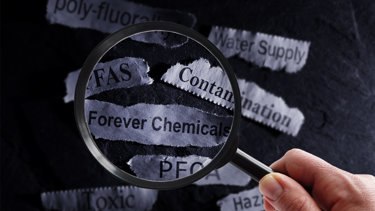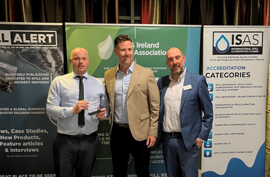The issue of PFAS is not going away
Published: 15 January 2025
The Guardian has just launched a series of articles on PFAS (per- and polyfluoroalkyl substances), following some joint investigations with other publications across Europe (coordinated by Le Monde).
The investigations involve around 14,500 previously unpublished documents and follows the submission of many freedom-of-information requests by Corporate Europe Observatory, a non-governmental campaign group based in Brussels.

Why the issue of PFAS and why now?
The answers to these questions are intertwined and probably best explained by the slew of information that is emerging about the persistence of PFAS compounds and the negative health effects from exposure to them, allied to some recent legal cases that have been brought in the US.
The term ‘forever chemicals’ is commonly applied to PFAS. While the use of this term is debated, it is also true to say that many PFAS chemicals – including those of higher concern – are so long-lasting that it is unknown how long it might take for them to break down. That means even PFAS compounds that may have been phased out many years ago, such as PFOS, are still present in the environment.
Some specific PFAS compounds have also been linked to health conditions such as testicular and kidney cancers, developmental delays in children, and decreased fertility. It is this combination that has helped lead to some large lawsuits in North America against manufacturers of PFAS, such as DuPont, its spinoff Chemours, and 3M.
In March 2024, 3M reached a settlement with countrywide public water suppliers in the US of up to $10.3 billion payable over 13 years, for any supplier that has detected any form of PFAS at any level or may do so in the future. This is quite an expensive and wide-ranging settlement, so the question arises as to whether it could happen in Europe?
The short answer is ‘maybe’.
How concerned should we be about PFAS?
One reason to be concerned is that it is not very easy – or indeed cheap, as the articles point out – to remove and destroy PFAS. This is because of the strength of the chemical bonds. The main method currently used is high-temperature incineration, which is not only expensive but limited in capacity in the UK. However, research is ongoing into other methods. PFAS is an issue that we covered in more depth in our white paper, A Comprehensive Exploration of Business-Relevant Pollutants, but it is likely to affect many businesses, whether directly or indirectly. Such is the pace of developments since the publication of this white paper, we are already working on an update.
One issue that you need to consider is whether you may be affected by PFAS contamination on your site, even if you didn’t use it. There are also increasing restrictions around PFAS use which may require you to change your product formulations. So, it is better to quantify the problem sooner rather than later, not least because insurers may require this.
We are also all consumers too, of course. ln all likelihood, we are being exposed to low levels of PFAS every day and there is little we can do as consumers to reduce that. But the risks to our health are also likely to be low; we should be concerned but not alarmed. We can also make informed choices when buying certain products like food packaging, dental floss, or clothing. Our white paper includes links to websites where you can check which products contain PFAS.
While the term ‘forever chemicals’ may be debatable, there can be no doubt that the issue of PFAS is not going anywhere anytime soon.
You might also be interested in
 Insights
InsightsCorporate responsibility and sustainability: Addressing PFAS contamination
 Insights
InsightsForever chemicals: Navigating the PFAS challenge in the UK water industry
 Insights
InsightsAddressing the growing threat of PFAS in the UK
 Insights
InsightsRevolutionising management of forever chemicals: our award-winning PFAS solution
Environmental compliance today, creating a sustainable tomorrow
Helping you reduce risk to the environment and your operation by managing assets compliantly while achieving commercial, ESG, and net-zero goals.
Contact our experts
